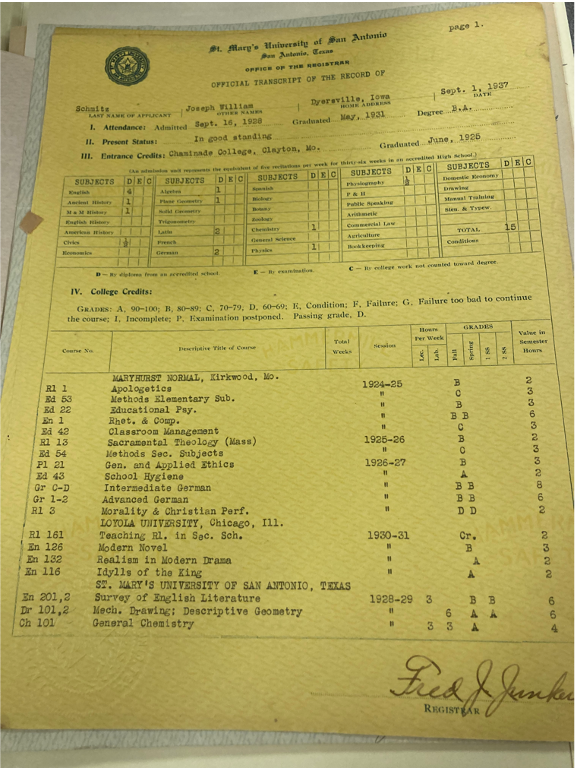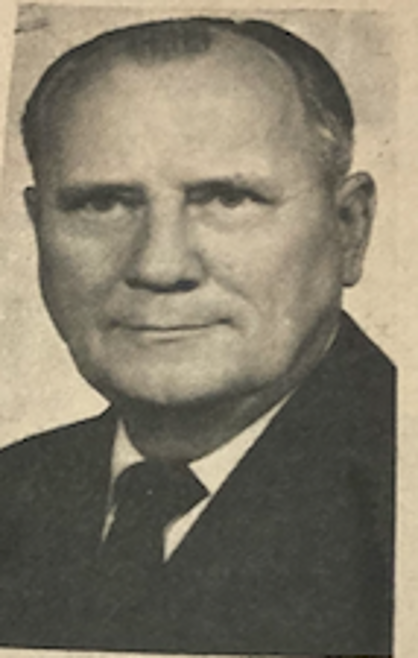By Patrick Coan
This post is from our 2024 Spring Internship series.
I worked at the National Archives of the Marianist Province of the United States or NAMPUS for my public history internship this semester. The archives are located on the campus of St. Mary’s University and has a rich collection. For example, it contains the permanent record of the governance and administration of the provinces of the Society of Mary within the United States from 1849 to the present. NAMPUS also has a variety of primary sources dealing with historic members of the Society of Mary such as their publications, personal papers, and artifacts. Finally, the archives have the private files of each Provincial Superior and his staff which reflect their spiritual, economic, educational, and apostolic activities from the 19th Century to the 21st Century. All of the items and materials at NAMPUS reflect its mission of preserving the history of the Society of Mary in the United States. Mary Kenney and Lisa Finnie are the archivists at NAMPUS, and they helped supervise the research that I conducted through my internship.

I conducted research on Brother Joseph Schmitz during my internship. Brother Schmitz was a significant individual in St. Mary’s history and Texas history. He is significant in the history of St. Mary’s because he was not only a vowed Marianist, but he was also a history professor at the university. Through his role as a St. Mary’s history professor, he served as the Chairman for the History Department at the undergraduate and graduate levels, advised students on their class schedules and theses, and was the Faculty Representative of the Student Council. Brother Schmitz was significant in Texas history because he was a historian whose works were ground-breaking contributions to that field.
I performed several tasks over the course of my internship at the archives. One of the tasks that I performed was I read the books that Brother Schmitz wrote. Through his roles as a St. Mary’s history professor and a historian, Brother Schmitz wrote several books on Texas history and the history of the Marianists. These works were Thus They Lived: Social Life in the Republic of Texas, The Beginnings of the Society of Mary in Texas, 1852-1866, The Society of Mary in Texas, Texan Statecraft: 1836-1845, and Texas Culture: In the Days of the Republic. My goal of reading these works was to glean information from the footnotes to get insight into what sources Brother Schmitz used as a historian and where these sources came from. The footnotes of each book revealed that he utilized many different types of primary sources.
These primary sources included the personal correspondence of Marianist brothers, newspaper articles, diaries of Texas settlers, treaties and journals, and many other documents. The footnotes also revealed that Brother Schmitz used sources from various archives to produce his works. For example, Brother Schmitz used primary sources from the Texas State Department archives, the San Antonio Public Library, and private papers at the University of Texas to write Texan Statecraft. In addition to reading Brother Schmitz’s books, I read his master’s thesis and PhD dissertation. His master’s thesis was titled “The Social Conditions in the Republic of Texas: 1836-1845.” This thesis was expanded into his books Thus They Lived and Texas Culture. The PhD dissertation that Brother Schmitz wrote was titled “The Diplomatic History of the Republic of Texas. This work was expanded into Texan Statecraft.


Another task that I performed during my internship was I analyzed many of the personal papers in the Brother Schmitz collection at the archives. These personal papers included transcripts, religious documents, correspondence with his family and fellow Marianists, newspaper articles that discussed him, and biographical CVs. I uncovered many interesting findings by analyzing the papers in this collection. One finding that I had was three members of Schmitz’s immediate family also became vowed religious. His sisters Isabelle, Dorothy, and Anna Schmitz all became vowed religious. I also discovered that Brother Schmitz was the first president of the San Antonio Historical Association and a member of the executive council of the Texas State Historical Association before becoming vice president of the organization.
My final task was to create a bibliography of the sources that I analyzed. This was initially difficult because there were so many different types of sources within the Brother Schmitz collection. However, to make citing the sources for my article easier, I used Zotero. Zotero was very helpful because it enabled me to cite sources in Chicago format that I was not used to citing such as letters. Using Zotero allowed me to keep track of all the sources that I wanted to include in my article as well.
I learned many lessons through my internship experience. One lesson I learned was how to use my time wisely by reading the actual sources instead of worrying about what order I should read them in. This was an important lesson for me to learn because it is easy to become overwhelmed by the amount of sources you have to analyze when you conduct research. This happened to me during my first couple of weeks at the archives, but I was eventually able to start analyzing the various sources in a timely manner as my internship progressed. I also learned that history does not just have to focus on the stories of figures that we are familiar with.
I learned this lesson because Brother Schmitz’s works elevated the stories of ordinary people. This is significant because many historical works that address Texas history emphasize figures that people are more familiar with such as Sam Houston and Stephen F. Austin. However, Brother Schmitz focuses on the daily life of ordinary Texans and the contributions of the Marianists in Texas which makes Texas history come alive in a new way.
I gained many hard skills through my internship experience. One hard skill that I gained was how to establish a clear and consistent methodology. This was definitely easier said than done. This is because it was difficult to determine what key details I needed to extract from the sources I was reading. For example, I was not sure what I should include in my article about Brother Schmitz’s correspondence with his family and fellow Marianists. However, I eventually established a clear methodology for writing about the correspondence and the other sources that were contained in the Brother Schmitz collection.
The methodology that I utilized to extract key findings was to look at the date that the source was written, where it was written, and what the purpose of these sources were. Then, I wrote down all these aspects to see what they revealed about Brother Schmitz’s life. Another hard skill that I gained was the art of storytelling. I gained this skill because my research was designed to tell the comprehensive story of Brother Schmitz’s life and contributions. To ensure that I provide a comprehensive story about Brother Schmitz in my article, I keep a research log filled with research notes and findings. As I have been writing about Brother Schmitz, I have been analyzing and synthesizing these research notes and findings. This will help me accomplish my goal of sharing the story of Brother Schmitz with a wider audience and adding it to the story of Texas history.
I gained soft skills through my internship experience as well. One soft skill that I gained was problem-solving. I gained this skill through my work on the education and religious formation sections of my Brother Schmitz article. To solve this issue, I first wrote both sections on my own just to have ideas written down. Then, I consulted my fellow peers and Dr. Wieck to see how I could improve the organization of the ideas. Another soft skill that I gained was adaptability. I gained this skill by adjusting the way I went about my Brother Schmitz research when I was prevented from going to the archives at different times in the semester. I adjusted the way I went about my research by taking pictures of the sources in the archives on days that I could conduct research there and analyzing them on my own on days that I could not go to the archives.
My internship experience at the archives is going to benefit my future career as a college history professor. This is because it taught me how to write about the research process that historians engage in. I was able to do this by analyzing Brother Schmitz’s letters to his fellow Marianists where he asked for resources that he could use in his works. This was an important skill for me to gain because when I become a college history professor, I will be engaging in my own research process which I will need to be able to articulate. My internship experience also gave me the opportunity to learn how to analyze the various roles that historical figures play in their lives. Being able to understand the different roles that historical figures play will be helpful for my future career. This is because as a college history professor, I will need to be able to provide my students with a complete picture of the historical figures that I teach them about.
I believe that the Public History program at St. Mary’s requires students to engage in an internship so that they contribute to the work of institutions and organizations that are dedicated to sharing history. This is important because the goal of public history is to engage in storytelling so that others can gain insight into the figures and events that make up history. This storytelling occurs through a variety of media such as articles, digital exhibits, and archives. I believe that the Public History program at St. Mary’s also requires students to engage in an internship so that they can strengthen their research skills. Students learn how to analyze digital and nondigital sources, organize and record research findings, and engage in the process of historical writing. These skills are essential for individuals to transition from students into public historians and scholars. Due to my internship experience, I will be prepared for being a part of the History PhD program at Texas A&M University.